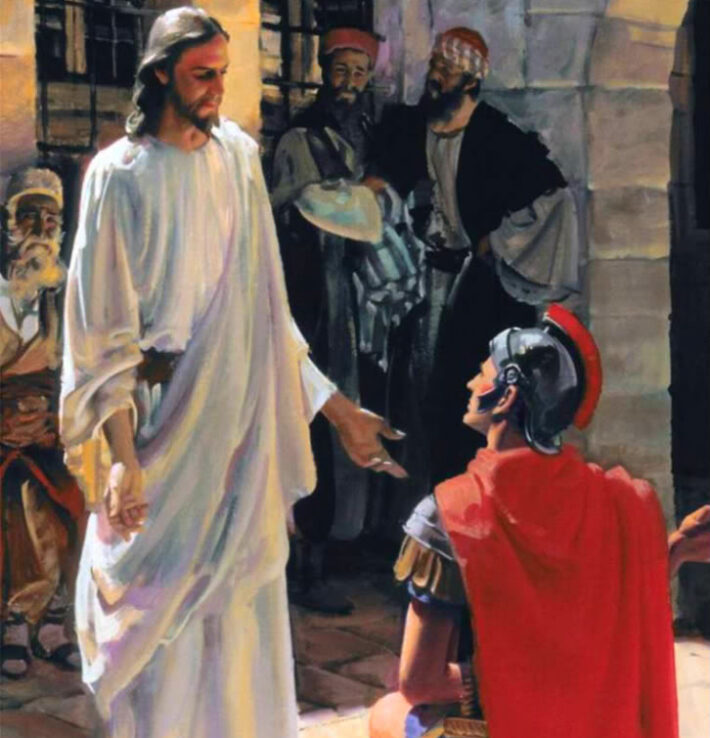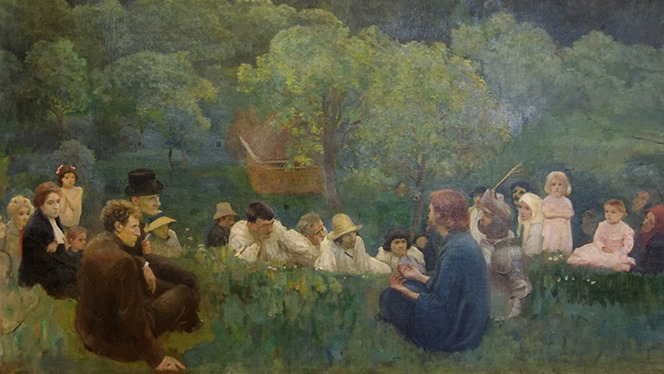Christian Art | The Centurion’s Faith | King James Audio Bible KJV
Luke 7: 1-10 – Week 24 Ordinary Time, Monday (King James Audio Bible KJV, Spoken Word)
NOW when he had ended all his sayings in the audience of the people, he entered into Capernaum.
2 And a certain centurion’s servant, who was dear unto him, was sick, and ready to die.
3 And when he heard of Jesus, he sent unto him the elders of the Jews, beseeching him that he would come and heal his servant.
4 And when they came to Jesus, they besought him instantly, saying, That he was worthy for whom he should do this:
5 For he loveth our nation, and he hath built us a synagogue.
6 Then Jesus went with them. And when he was now not far from the house, the centurion sent friends to him, saying unto him, Lord, trouble not thyself: for I am not worthy that thou shouldest enter under my roof:
7 Wherefore neither thought I myself worthy to come unto thee: but say in a word, and my servant shall be healed.
8 For I also am a man set under authority, having under me soldiers, and I say unto one, Go, and he goeth; and to another, Come, and he cometh; and to my servant, Do this, and he doeth it.
9 When Jesus heard these things, he marvelled at him, and turned him about, and said unto the people that followed him, I say unto you, I have not found so great faith, no, not in Israel.
10 And they that were sent, returning to the house, found the servant whole that had been sick.
‘Domine, non sum dignus, ut intres sub tectum meum, sed tantum dic verbo, et sanabitur anima mea.’ ‘Lord, I am not worthy that you should enter under my roof, but only say the word and my soul shall be healed.’
With these words, so many of us will seek to rid ourselves of bad thoughts before receiving communion. We have recollected ourselves in silent time to examine our consciences, we have confessed, we have listened to readings from Scripture – and even in that short time following there has been time to sin anew, as also there is heightened awareness of our sins, and too of inherent sinfulness.
To people who are not Christians, this might sound like a bleak situation! As Christians, we know that really the situation is entirely the opposite. Even now, as the Mass is well under way and as we are about to receive the body and blood of Christ, at the eleventh hour, as it were, there is a further opportunity to repent and to ask God’s forgiveness. Lord, I am not worthy that you should enter under my roof, but only say the word and my soul shall be healed.
This prayer can mark the approach to the summit of the Mass. We have prayed the Lord’s prayer, and we have offered one another the sign of peace, which is a sharing of such sincere joy at being together with Jesus. Now we find ourselves readying ourselves once more for a further meeting with God – a welcoming into ourselves of God. Even as we are in community, sustained by community, we are also individually present before God. There is no hiding anything now. We must give ourselves utterly – warts ‘n’ all.
The ways in which we respond to this situation are indicative of the joy of Christian faith. When we are called to meet with God, and when we can hide nothing, we know that because of what Jesus did we can say sorry, we can acknowledge to God that we are not worthy of His love, and then can bow our heads and rejoice and relax and accept His saving presence in our lives. ‘Lord, I am not worthy.’ This is God’s grandeur: God loves us just the way that we are.
Concluding Prayer | Love Revealed By Jesus Christ
Lord God,
who entrusted the earth to men
to till it and care for it,
and made the sun to serve their needs:
give us grace this day to work faithfully for your glory
and for our neighbour’s good.
We make our prayer through our Lord.
![]()

King James Audio Bible | Endnotes
The Centurion’s Faith
The story of the Centurion’s faith, found in Luke 7:1-10, is a powerful testament to the power of faith, humility, and the authority of Christ. In this story, a Roman Centurion comes to Jesus, requesting that he heal his servant who is sick and about to die. What is remarkable about this request is not just the fact that a Roman soldier is asking for the help of a Jewish healer, but the faith that the Centurion displays in his request.
We also recognize the love of the Centurion for his servant. Perhaps we might sense more of a protégé rather than a slave. That there should be such love within the Roman military might well seem a promise of goodness both to come and already.
The Centurion, recognizing Jesus’ authority and power, states: ‘Lord, I am not worthy that thou shouldest come under my roof: but speak the word only, and my servant shall be healed.’ (Luke 7:6-7) This statement displays a profound humility and faith, as the Centurion acknowledges that he is unworthy to have Jesus come to his home and heal his servant, but believes that Jesus has the power to heal from a distance, simply by speaking the word.
Such is the power of the Centurion’s words that they are paraphrased within the ritual of the Catholic communion: ‘Lord, I am not worthy that you should enter under my roof, but only say the word and my soul shall be healed.’
This kind of faith is not unique to the Centurion, but is a recurring theme throughout the Bible. Hebrews 11:1 defines faith as ‘the substance of things hoped for, the evidence of things not seen’, and this faith is demonstrated time and again by those who trust in God’s power and authority. In the Old Testament, Abraham believed God’s promise that he would have a son, even though he and his wife were advanced in years and barren (Genesis 15:6). Similarly, in the New Testament, the woman with the issue of blood believed that if she touched Jesus’ garment, she would be healed (Matthew 9:20-22).
This kind of faith is not limited to individuals, but can also be displayed by communities of believers. In Acts 4:23-31, the disciples of Jesus pray for boldness and the power to perform signs and wonders in Jesus’ name, and their prayers are answered when the place where they are meeting is shaken and they are filled with the Holy Spirit.








